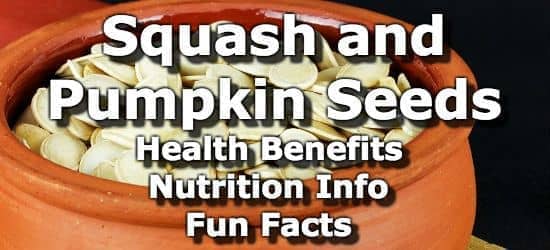Squash and Pumpkin Seeds: Health Benefits, Nutrition Info, Fun Facts
Squash and pumpkin seeds are among the most nutrient dense foods on the planet and have numerous health benefits.
They are a great source of vegan protein and zinc and are also high in minerals like manganese, magnesium, phosphorus, copper, and iron.
Squash and pumpkin seeds are found in almost every grocery store, but can also be taken and roasted from most types of winter squash and pumpkins as well.
Read on below for details on squash and pumpkin seeds health benefits, nutrition information, and fun facts.
Squash and Pumpkin Seeds Health Benefits
1. Squash and Pumpkin Seeds Are a Great Source of Zinc
Squash and pumpkin seeds provide more zinc than any other nut or seed and is a top source of zinc for vegetarians and vegans (1). Zinc's numerous health benefits include boosting immune function, aiding in wound healing, slowing the progression of macular degeneration, and reducing the duration of the common cold (2).
2. Squash and Pumpkin Seeds Can Help Prevent Cardiovascular Disease
Nuts and seeds are some of the heart healthiest foods around. This is likely due to the fibers and healthy fats found in nuts and seeds. There are numerous studies to prove the link between nuts and seeds and good heart health. In one such study participants who ate nuts twice a week vs those who never ate nuts cut their risk of sudden cardiovascular death by 50% (3).
3. Squash and Pumpkin Seeds Are a High in Unsaturated Fats
Depending on the type of squash or pumpkin the seeds are composed of between 10-30% oil. Of these oils 73-80% is composed of unsaturated fatty acids (4). While there is a lot of controversy surrounding saturated fats and heart disease, there are still studies which suggest that a diet higher in unsaturated fats vs saturated fat reduces the risk of cardiovascular disease (5).
4. Squash and Pumpkin Seeds Are a Great Source of Protein
Squash and pumpkin seeds are a top source of protein for vegans and they provide all the essential amino acids (6). 200 calories (45g) worth of squash and pumpkin seeds provide 8.3grams (21%DV) of protein (6).
5. Squash and Pumpkin Seeds Protect Against Osteoperosis
Squash and pumpkin seeds are very high in both manganese and magnesium both of which have been shown to be critical to healthy bones. Manganese is involved in bone development, and magnesium aids in calcium metabolism and strong bones. (7,8).
Squash and Pumpkin Seeds Fun Facts
- Pumpkin Seeds are called Pepitas in Spanish, and are eaten in Mexico year round.
- While pepitas are basically pumpkin seeds, they differ in the fact that they don't have shells, and are grown from special pumpkins which are known for their seeds and not flesh.
- Types of pumpkins and squash which yield good seeds are: Lady Godiva Pumpkin, Austria Oil Seed Pumpkin, Gleisdorfer Naked Seeded Pumpkin and Kakai Hulless Pumpkin.
- Squash has been cultivated since at least 8000-10,000 years ago, which is earlier than corn and beans.
- You can dry or roast most seeds from winter squash yourself at home.
- 1/2 cup of pumpkin seeds contains 360 calories and is best eaten in moderation.
Data Sources and References
- Vegetarian and Vegan Sources of Zinc
- Office of Dietary Supplements on Zinc
- Nut Consumption and Decreased Risk of Sudden Cardiac Death in the Physicians' Health Study
- Oil and Tocopherol Content and Composition of Pumpkin Seed Oil in 12 Cultivars
- Saturated Fats Compared With Unsaturated Fats and Sources of Carbohydrates in Relation to Risk of Coronary Heart Disease: A Prospective Cohort Study
- Nutrition Facts for 1 ounce of dry roasted squash/pumpkin seeds
- High Manganese Foods and Health Benefits
- High Magnesium Foods and Health Benefits
